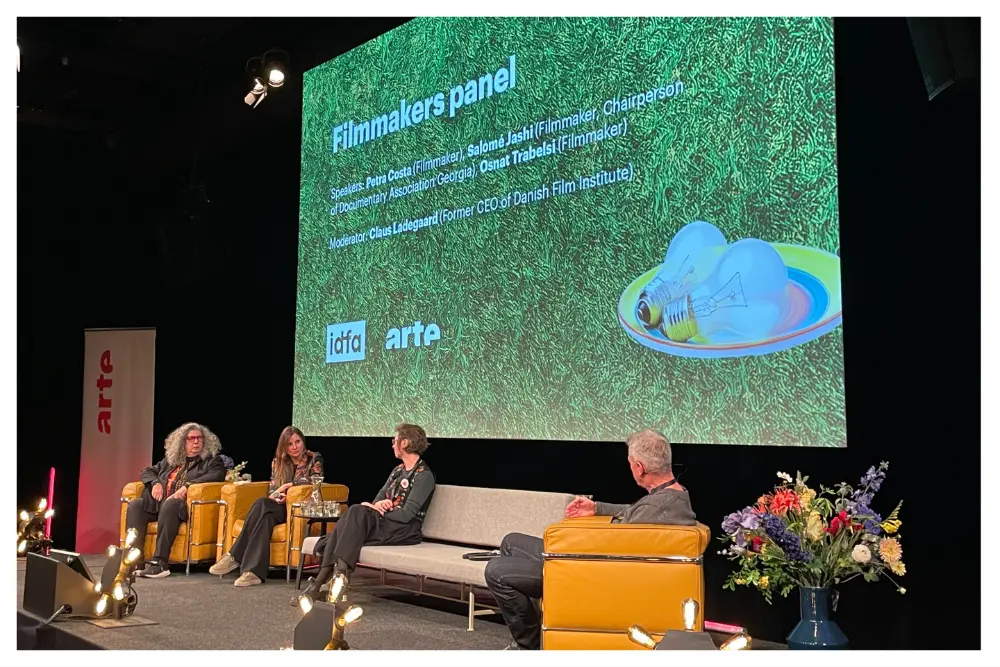Documentary filmmakers and industry leaders gathered at this year’s International Documentary Film Festival Amsterdam to discuss “independence and resistance in times of repressive populism” at the festival’s yearly Europe Conference in partnership with French public broadcaster Arte. IDFA’s artistic director Orwa Nyrabia introduced the conference by highlighting the “rising success” of populist movements in Europe and across the world and how they recognise filmmakers “as their enemy.”
“They very quickly realize that culture is not their friend and that documentary people are their main enemy because we tend to criticize immediately. They should not have the power to stop us,” he said.
Nyrabia added that there are also cases “like in Germany” where it is “not even right-wing, but left-wing that is silencing voices,” going on to mention the recent episode where the official Berlin city portal described the Israeli-Palestinian documentary “No Other Land,” co-directed by Israeli journalist Yuval Abraham, as having “anti-Semitic tendencies” ahead of the film’s release in Germany. A few days later, new Berlinale director Tricia Tuttle released a statement in support of the film.
Popular on Variety “I want to be clear that I don’t consider the film, or statements made by co-directors, Palestinian Basel Adra and Israeli Yuval Abraham at the awards ceremony of the Berlinale to be anti-Semitic,” the statement read. “I also believe that discourse which suggests this film or its filmmakers are anti-Semitic creates danger for all of them, inside and outside of Germany, and it is important that we stand together and support them.”
“No Other Land” is screening at IDFA in the Best of Fests strand and it received a special screening followed by a Q&A with Nyrabia and Oscar-winning documentarian Laura Poitras. Nyrabia called the film “healing,” and said it is “being accused of being anti-Semitic while it is doing the opposite.”
The subject of films criticizing the Israeli regime recently being labeled as anti-Semitic came up again later in the conversation when one of the panelists, Israeli producer Osnat Trabelsi, got a text message live on stage saying that audience members shouted “Nazi propaganda” at her IDFA-entry “The 1957 Transcripts” during one of the film’s screenings at the festival. She was visibly shaken by the update, adding, “When you criticize Israel, this is what you are accused of. And we are from there.”
“The 1957 Transcripts” chronicles the massacre of 49 residents of the Palestinian village of Kafr Qasim who were murdered in cold blood by soldiers of the Israeli Border Police in October of 1956. It features testimonies of survivors and historians plus a re-enactment of the military trial of the soldiers involved, based on recently released transcripts.
Trabelsi spoke about feeling conflicted about whether or not to accept public funding from her home country, which she called “a democracy in disguise.” “[The Israeli government] likes to say we are the only democracy in the Middle East but it acts like an authoritarian regime. In the last decade, it has become difficult to make films criticizing the government. The documentary I am showing here wouldn’t get funded today. We got funded 10 years ago.”
“There is also censorship in the news in Israel,” continued the producer. “They don’t show what is happening in Gaza and the whole consciousness of the people is different than what you see [at IDFA].” Of navigating the complex political waters of being an Israeli filmmaker making documentaries about the Palestinian cause, Trabelsi said, “It is difficult as the perpetrator to make films about the victims. I only do films dealing with Palestine if I have the right to tell the story. [‘The 1957 Transcripts’] deals with protocols of the trial, otherwise I wouldn’t have told the story. It is about moral decisions, also.”
The producer is not the only filmmaker conflicted about taking money from her national funding body. Brazilian director Petra Costa, Oscar-nominated in 2020 for “The Edge of Democracy” and at IDFA this year with “Apocalypse in the Tropics,” recalled how during the Jair Bolsonaro presidency from 2016 to 2020, the national film agency would “punish the progressives by investigating and finding ridiculous problems with filmmakers who had opposed the government. It was a political persecution, which is what makes me insecure to get state money in Brazil today even if we are under a democratic government.”
“What if we go back in two years when I have been so critical of the government?” she posed, going on to recall how, on the day she got the news of her Oscar nomination, she couldn’t celebrate because she was trending on X, then Twitter, as a “traitor of the Brazilian government,” with a congressman and Bolsonaro supporter asking for her arrest for “betraying the country.”
“We will see what will happen. [President] Lula is putting funding into culture again but it will take a long time. Many filmmakers’ careers were destroyed and it is uncertain what will happen in two years,” concluded Costa.
Salomé Jashi, a filmmaker and chairperson of the Documentary Association of the Republic of Georgia, said that “there is no choice” on whether or not to agree to receive public funds for documentary filmmakers in Georgia. Through the association, directors have mounted a united front in the country to say no to public funds. “We don’t want to collaborate with a government that marginalizes parcels of society like queer people,” said Jashi. “It is a measure of unity. Right now, filmmaking is a political act. Even where you buy a coffee right now is political.”
When asked about possible solutions or alternatives on how to fight against populism as documentarians, the filmmakers were uncertain about whether there are concrete solutions at hand, but all agreed that it is “not enough” to make documentaries if audiences are not watching them. “We have to make more effort to reconnect with grassroots activism because otherwise, the working class becomes susceptible to this poison that is fascism,” emphasized Costa.

 Italian
Italian







